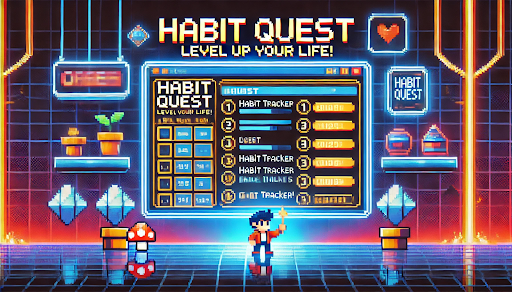
Monthly Habit Tracker: The Ultimate Accountability Partner
Mar 2, 2025
By Will Moore
In 1726, a young Benjamin Franklin embarked on an ambitious project to improve himself. He developed a simple but powerful habit tracker that measured his progress in 13 virtues, from temperance to humility.
Each evening, he'd mark his successes and failures with black spots in a small notebook, reviewing his complete record at the end of each month.
Approximately 300 years later, despite the thousands of iterations of ol’ Ben’s system, there’s still not one simple, proven, universally accepted/proven way to track habits that’s simple, fun, and effective.
Why? We’re all unique individuals with different preferences and inclinations. Good news is science and tech have evolved to offer a ton of habit-tracking choices, and the key is to find the right one that works for you.
Upgrades You'll Receive From This Blog:
Clear Understanding: Discover why a monthly habit tracker is your secret weapon for lasting change, how to use one effectively, and the best options available.
Action Plan: Get a practical, gamified, step-by-step system for setting up your tracking method across the 5 key areas of life that matter most.
Success Blueprint: Learn proven strategies to maintain momentum and overcome common obstacles that derail most people's habit-building efforts.
What is a Monthly Habit Tracker?
At its core, a monthly habit tracker is your personal success dashboard—a systematic way to monitor and record your daily habits, and ensure you follow through on them. Think of it as a combination of a calendar, checklist, and accountability coach all rolled into one powerful tool.
Whether you prefer a printable habit tracker, digital app, or structured journal, the concept remains the same: create a visual record of your daily actions that compound into meaningful change.
Your tracker becomes a reliable mirror, reflecting both your consistency and areas needing attention.
The beauty of a monthly habit tracker lies in its versatility. You can use it to:
Monitor progress toward specific goals
Build new positive habits
Break unwanted patterns
Maintain motivation through gamification and visual feedback
Create lasting behavior change
The most effective trackers strike a balance between simplicity and comprehensiveness.
What are the benefits of using a habit tracker?
Let's explore how this simple tool can transform your approach to personal growth and goal achievement.
1. Enhance Self-Awareness and Personal Growth
A monthly habit tracker acts as your personal mirror, reflecting patterns you might otherwise miss. By tracking your habits, you begin to see clear connections between your daily actions and their outcomes. This heightened awareness becomes your foundation for meaningful change.
For example, you might notice that your energy levels consistently dip on days when you skip your morning routine, or that your productivity soars when you maintain a regular sleep schedule. These insights become powerful catalysts for personal growth.
2. Built-in Structure and Accountability Partner
Your tracker serves as more than just a record—it becomes your reliable accountability buddy. Unlike a traditional accountability coach, which often relies on external check-ins, a monthly habit tracker provides immediate, honest feedback about your progress.
Think of it as having a trusted friend who:
Never forget to check in
Maintains a perfect memory of your commitments
Celebrates every win
Keeps you honest about areas needing improvement
3. Increased Motivation Through Visual Progress and Gamification
One of the most powerful aspects of a monthly habit tracker is its ability to turn abstract goals into visible progress. By incorporating elements of gamification—like streaks, milestones, and achievement unlocks—tracking becomes an engaging journey rather than a tedious chore.
Seeing your progress visualized triggers the same reward pathways in your brain that make video games addictive but channels this energy toward positive change. Each check mark becomes a small victory, building momentum toward larger achievements.
Learn More: How to Gamify Your Life
4. Clearly Define Goals and Make Adjustments Along the Way
A monthly habit tracker forces clarity. It transforms vague intentions like "exercise more" into specific, trackable actions like "complete 30 minutes of strength training." This precision makes it easier to:
Monitor progress effectively
Identify obstacles early
Make data-driven adjustments
Related Article: 7 Steps of Goal Setting
5. Sustainable Long-term Change
Perhaps most importantly, a monthly habit tracker helps you build sustainable change by focusing on discipline and consistency over perfection. It shows you that:
Small daily actions compound into significant results
Perfect streaks aren't necessary for progress
Recovery from setbacks is more important than avoiding them
Long-term patterns matter more than daily fluctuations
Understanding these benefits is crucial, but the real power comes from implementing them effectively. Let's explore exactly how to set up your habit tracker for maximum impact.
How to Use a Monthly Habit Tracker Effectively
How do I create a monthly habit tracker that actually works? Let's break down the process into three key steps that will set you up for success.
Step 1: Choose Your Monthly Habit Tracker
Your first decision is to select the right habit-tracking method that suits you best. Digital habit tracking apps offer many advantages, including:
Built-in gamification: Progress visualization, Rewards, or social aspects for competing, collaborating, and sharing
Customizable
Automated reminders
Detailed analytics
Syncing across devices for easy access
7 Best Habit Tracker Apps:
1 - 5 Core Life
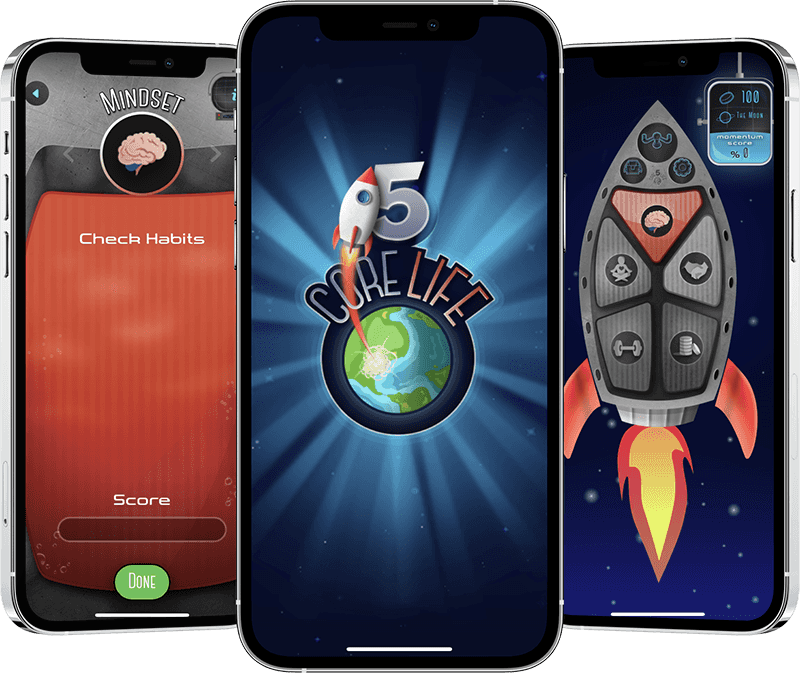
This gamified habit tracker has it all. It’s an ethically addictive journey of replacing your habits one by one in the 5 Core Areas Of Life that matter most.
Features:
Gamification at its best: Your rocket represents your 5 Cores, and your mission is to learn the secrets of the universe to upgrade your habits and bring them back to save the rest of humanity.
Stay engaged as you visit new planets with aliens offering variable real-world and in-game rewards.
Compete against others and show off your ship’s upgrades and momentum points.
Collaborate with others in the “Space Cantina” for maximum accountability and idea sharing.
Personalized Habit Optimization – The app customizes your habit-building journey based on your personality, lifestyle factors, and unique goals.
Adaptable Progression System: The easy-to-navigate design is suitable for beginners, and ramps up to increasing difficulty levels as you strive for an expert player firing on all cylinders!
2 - Habitify
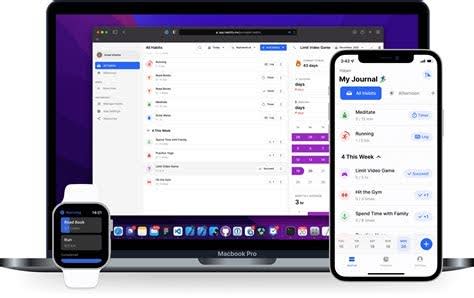
Habitify offers a minimalist design to help users track habits across multiple platforms, including mobile and web.
Features:
Cross-Platform Syncing: Ensures seamless data synchronization between devices.
Comprehensive Analytics: Provides detailed statistics to monitor progress and identify patterns.
Community Challenges: Engages users with social competitions to foster motivation.
3 - Streaks
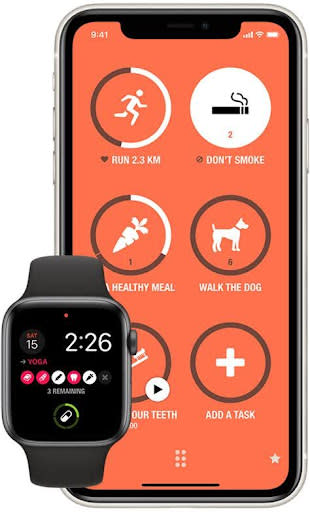
Streaks focuses on helping users build and maintain consecutive days of habit completion, emphasizing consistency.
Features:
Health App Integration: Syncs with Apple Health to automatically track health-related habits.
Customizable Reminders: Allows setting specific reminders for each habit to ensure adherence.
Negative Habit Tracking: Enables monitoring and reduction of undesirable habits.
4 - Habitica
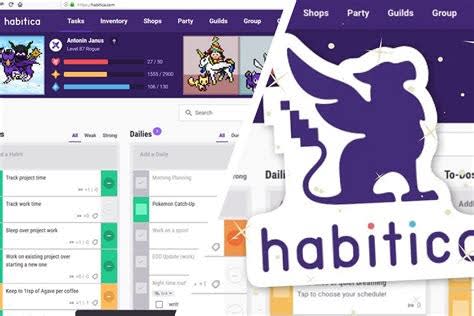
Habitica turns habit tracking into a game, rewarding users for completing tasks to enhance engagement.
Features:
Gamified Experience: Transforms tasks into quests, making habit tracking interactive and fun.
Social Collaboration: Allows joining parties with friends to tackle challenges together.
Customization Options: Offers personalized avatars and rewards to maintain motivation.
5 - Fabulous

Fabulous provides a holistic approach to habit building, focusing on overall well-being and routine enhancement.
Features
Science-Based Coaching: Utilizes evidence-backed methods to guide users through habit formation.
Comprehensive Habit Programs: Includes features like guided meditations, exercise routines, and sleep aids.
Progressive Habit Formation: Encourages starting with small habits and gradually building up to more significant changes.
6 - Atoms
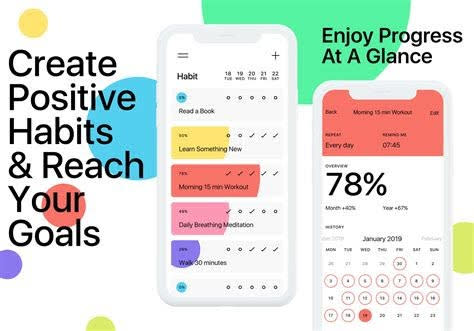
Developed by James Clear, author of Atomic Habits, Atoms is designed to help users implement the book's habit-forming principles.
Features
Science-Backed Framework: Utilizes the four laws of behavior change: make it obvious, attractive, easy, and satisfying.
Bite-Sized Lessons: Offers concise insights and strategies to facilitate gradual habit development.
Progress Tracking: Monitors habit streaks and provides feedback to maintain motivation.
7 - Way of Life
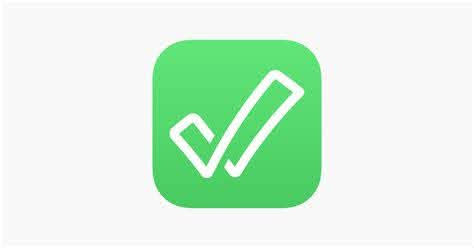
Way of Life is a habit-tracking app that employs a color-coded system to help users build good habits and break bad ones.
Features:
Visual Data Representation: Uses pie charts and bar graphs with trend lines to illustrate progress.
Customizable Reminders: Allows users to set specific reminders for each habit to ensure consistency.
Note-Taking and Tags: Features note-taking capabilities and customizable tags for better habit organization.
Each of these apps offers unique features tailored to different user preferences, whether you're seeking a gamified experience, cross-platform accessibility, or a focus on overall well-being.
Step 2: Organize and Simplify Your Habits Using Categories
Once you’ve chosen your preferred habit tracker, the next big question is “What habits should I track?”
The answer is twofold. You’ll want to track habits that:
Have proven themselves over time to have the deepest and long-lasting impact on a person’s life.
Can easily be customized to fit your unique personality, lifestyle, and goals.
The most effective way to structure your monthly habit tracker template is by organizing habits into key life areas. This ensures balanced growth and prevents overemphasis on any single aspect of your life.
Here are the 5 Core Areas Of Life to track, along with three habit examples recommended for each:
1. Mindset Core: Develop a “growth owner mindset” who fails forward, sees obstacles as temporary roadblocks, and gives fear the finger.
Morning success routine (review of mantra, things you are grateful for, and priorities for the day)
Problem-solving framework practice (turning obstacles into opportunities)
Evening reflection on growth wins and failures learned from
2. Career & Finances Core: Make a living doing what you love and are great at, fulfilling your purpose, and exponentially growing your wealth along the way.
Assess accomplishments from the day before and reprioritize
Automated savings/investment check-in
Daily skill development in industry trends (30 minutes)
Learn More: How to find your Ikigai
3. Relationships Core: Create and maintain deep, fulfilled relationships and gain allies to achieve goals.
Regular practice initiating meaningful conversations and being a better listener.
Scheduled check-ins with important people
Active value-adding actions for others
4. Physical Health Core: Look good, feel good, and gain the energy and stamina to propel you through life.
Personalized exercise routine (based on preferences)
Sleep optimization routine (consistent schedule + wind-down)
Meal planning and prep with whole foods
5. Mental & Emotional Health Core: Manage stress, express your passions, and ensure the world is better for having you in it.
Daily mindfulness/meditation practice
Regular engagement in passion projects
Emotional intelligence practice in daily interactions
Step 3: Implement Best Practices
Now that you have your format and framework, here's how to make your tracking consistent and effective:
1 - Start Small
Begin with 1-2 habits per core area
Focus on establishing the tracking habit itself
Add complexity gradually
2 - Create Clear Success Criteria
Define what counts as completion
Make criteria measurable and keep daily targets achievable
Establish rewards for streaks and personalized success metrics.
3 - Establish Check-in Routines
Set alarm in the phone for morning review
Set alarm for daily scoring
Weekly pattern analysis
Monthly comprehensive review
Remember, the goal isn't perfection—it's progress. Your monthly habit tracker should feel like a helpful tool, not another obligation.
Making Your Monthly Habit Tracker Work For You
Below are 3 key ways to ensure you get the most out of your monthly habit tracker.
Key 1: Personalization is Key
The most effective habit tracker template is one that fits seamlessly into your life. Consider these personalization strategies:
Goal Alignment
Tracking your habits without understanding which ones will have the biggest impact on your life is like trying to steer without a wheel.
Become aware of where you currently stand in the main areas of your life where you want to end up, and set some starting habits to connect the two.
A good monthly habit tracker will have this feature embedded in it (i.e. 5 Core Life)
Adapt to Your Lifestyle & Rhythms
Your habit tracker should work with you, not against you—customize it to match your daily routines, energy levels, and natural tendencies so it seamlessly
Tailor your check-in/review/scoring times. Morning people can review during their coffee routine. Night owls might prefer an evening reflection
The key is consistency, not timing
Tailor Habits to Your Personality
The best habit tracker adapts to you—by selecting habits that align with your natural tendencies and preferences (i.e. strengths, passions, etc).
Ensure each habit you build is a “golden habit” that feels natural, sustainable, and built for long-term success.
Key 2: The Power of Monthly Reviews
At the end of each month, take time to:
Celebrate progress and grant yourself your pre-established rewards
Identify patterns and adjust goals as needed.
Continually personalize your habits to align with your personality, lifestyle, and goals. I.e. don’t set the habit of running 5 miles/day if you hate running, but instead find the physical activity you naturally enjoy and fits into your current routines/life.
Key 3: Be Aware Of Common Challenges To Overcome Them
1 - "I keep forgetting to track"
Use Habit Stacking: Link tracking to an existing habit
H.S. Formula: "After/Before [Current Habit], I will [New Habit]"
I.e. “After sitting down to begin work each day, I’ll prioritize my todo’s for the day
Set up strategic reminders (visible/enable push notification and set alarms)
2 - "I'm tracking too many habits"
Start with just 1-2 habits per core area vs trying to do all at once. You’ll become overwhelmed and quit before you build enough momentum to get going.
Master these before adding more
Focus on quality over quantity (those habits that have the biggest impact in your life)
3 - "I lose motivation after a few days"
Use the "never miss twice" rule
Celebrate small wins to connect your emotions/dopamine hits to future motivation
Find an accountability partner and/or a community like this gamify your life group on Reddit to share habit ideas and collaborate for growth
Remember, tracking is about growth, not judgment. Use your monthly habit tracker as a tool for self-discovery and continuous improvement across all five core areas of your life.
The Future of Habit Tracking
My personal habit-tracking journey has been quite a ride, and my strategy has taken many forms. Like many of you, I started with simple paper tracking (below is my very first tracker from 30 years ago -modeled after Ben Franklin’s), evolved to spreadsheets, and tried countless apps.
Eventually, I realized that none of these solutions fully addressed what makes habit formation both effective and enjoyable.
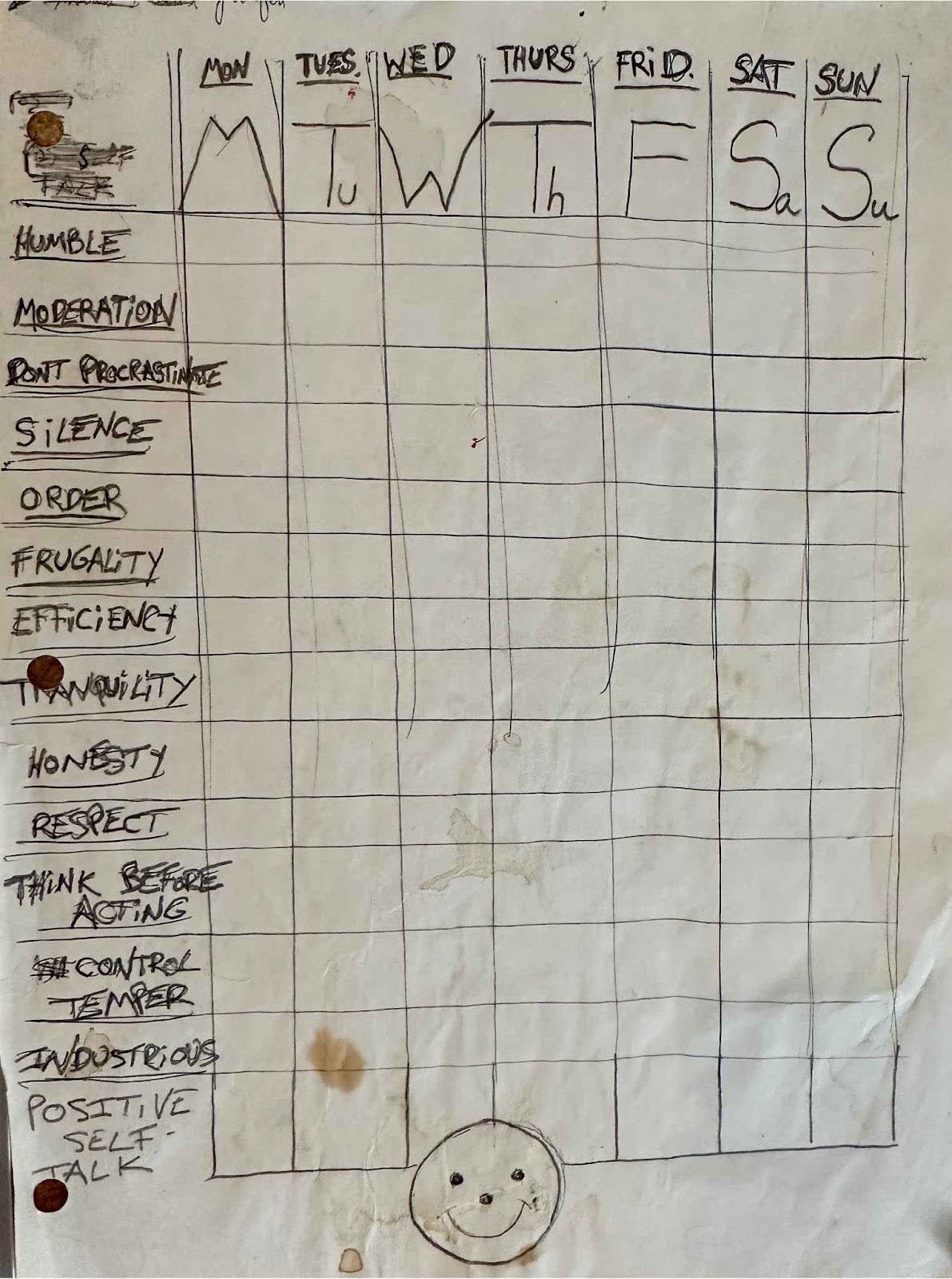
I knew one-day technology would catch up to my vision for a gamified app, and have been planning it for years waiting for the tools to be invented to create it.
Like Benjamin Franklin approx 300 years before me, I’ve combined years of research and taken the best of what’s available to me to come up with a solution that really works.
I not only use my monthly habit tracker for myself, but also for my life coaching clients who I’m grateful to have gotten the feedback to continually improve it.
Imagine a habit tracking system that:
Adapts to your unique personality and goals like an AI-powered accountability coach
Makes tracking feel as engaging as playing your favorite game
Provides real-time feedback and motivation through meaningful rewards
Connects you with like-minded individuals on similar journeys
Ensures balanced growth across all five core areas of life
The Game-Changing Digital Experience
An integral part of the Moore Momentum System, this isn't just another habit tracker app; it's a complete personal growth platform that:
Transforms you personalized "golden habits" into an engaging, gamified experience
Organizes your journey like a space mission, where your progress powers your rocket ship
Connects you with fellow travelers in the Space Cantina to collaborate and compete against each other.
Try the AI-powered habit tracking system that makes transformation simple, fun, and inevitable.
🚀 READY TO STOP TRACKING AND START TRANSFORMING?
You just learned how to track habits effectively—but what if your tracker could do more than just record check marks?
👉 Take the Core Values Quiz to discover your personalized Momentum Score and unlock the habit tracker that turns self-improvement into an addictive adventure.
In under 60 seconds, you'll get:
✅ A clear snapshot of where you stand in all 5 Core Areas
✅ Your biggest friction points holding back progress
✅ Your next best "Golden Habit" to build momentum
This isn't just another tracker—it's the gamified, AI-powered system that makes Benjamin Franklin's 300-year-old method feel like playing your favorite video game.
Begin Your Transformation HERE!
🚀🚀🚀 Don't forget to check out our RESOURCE ARCADE 👾🎮 for FREE templates and tools to gamify your habits.
Monthly Habit Tracker FAQ’S
How long do I need to track my habits?
There’s no magic number for habit formation—it depends on the complexity of the habit, your personal motivation, and your environment. Simple habits, like drinking a glass of water each morning, may stick quickly, while more complex behaviors, like regular exercise, take longer.
What is the 3-week habit rule?
The 3-week habit or 21/90 rule suggests that it takes around 21 days to form a habit. While this timeframe can help kickstart consistency, as mentioned above, it’s not an exact science. Instead of focusing on a set timeframe, focus on consistency, self-awareness, and building a supportive environment to make lasting changes.
How can a monthly habit tracker improve productivity?
A monthly goal planner or habit tracker template allows you to track progress over a longer period, helping identify patterns in your behavior. A habit tracker printable or digital habit tracker can serve as a productivity planner, keeping you focused on long-term self-improvement goals.
Are printable habit trackers effective?
Yes! A printable habit tracker offers a tangible way to visualize progress, which can be incredibly motivating. Some people prefer the physical act of checking off habits on a habit tracking journal, while others find digital tools like the best habit tracker apps more convenient. The key is consistency and choosing a method that fits your lifestyle.
Do habit trackers really work?
Absolutely! Habit trackers work by making behaviors more intentional, offering clear feedback, and reinforcing consistency. Whether you use a habit tracker calendar, a habit tracking app, or an accountability chart, tracking progress can significantly improve goal-setting success. Adding an accountability buddy can further enhance motivation and commitment.
Is there a Google habit tracker?
Yes! You can create a Google Sheets habit tracker or use Google Keep for simple habit tracking. While Google doesn’t have a built-in habit tracker, many users create their own with spreadsheets or third-party habit tracking apps that integrate with Google tools. If you’re looking for automation and ease of use, the best habit-tracker apps provide more robust features like reminders, progress insights, and habit-tracking challenges.
